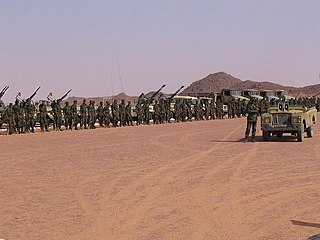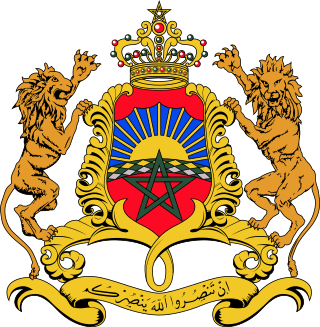
Morocco, officially the Kingdom of Morocco, is a country in the Maghreb region of North Africa. It overlooks the Mediterranean Sea to the north and the Atlantic Ocean to the west, and has land borders with Algeria to the east, and the disputed territory of Western Sahara to the south. Morocco also claims the Spanish exclaves of Ceuta, Melilla and Peñón de Vélez de la Gomera, and several small Spanish-controlled islands off its coast. It has a population of approximately 37 million. Islam is both the official and predominant religion, while Arabic and Berber are the official languages. Additionally, French and the Moroccan dialect of Arabic are widely spoken. The culture of Morocco is a mix of Arab, Berber, African and European cultures. Its capital is Rabat, while its largest city is Casablanca.
The history of human habitation in Morocco spans since the Lower Paleolithic, with the earliest known being Jebel Irhoud. Much later Morocco was part of Iberomaurusian culture, including Taforalt. It dates from the establishment of Mauretania and other ancient Berber kingdoms, to the establishment of the Moroccan state by the Idrisid dynasty followed by other Islamic dynasties, through to the colonial and independence periods.

Western Sahara is a disputed territory in North-western Africa. It has a surface area of 272,000 square kilometres (105,000 sq mi). Approximately 30% of the territory is controlled by the Sahrawi Arab Democratic Republic (SADR); the remaining 70% is occupied and administered by neighboring Morocco. It is the most sparsely populated territory in Africa and the second most sparsely populated territory in the world, mainly consisting of desert flatlands. The population is estimated at 618,600. Nearly 40% of that population lives in Morocco-controlled Laayoune, the largest city of Western Sahara.
The history of Western Sahara can be traced back to the times of Carthaginian explorer Hanno the Navigator in the 5th century BC. Though few historical records are left from that period, Western Sahara's modern history has its roots linked to some nomadic groups such as the Sanhaja group, and the introduction of Islam and the Arabic language at the end of the 8th century AD.

Mohammed al-Khamis bin Yusef bin Hassan al-Alawi, better known simply as Mohammed V, was the last Sultan of Morocco from 1927 to 1953 and from 1955 to 1957, and first King of Morocco from 1957 to 1961. A member of the 'Alawi dynasty, he played an instrumental role in securing the independence of Morocco from the French and Spanish Protectorates.

Mohammed VI is King of Morocco. A member of the 'Alawi dynasty, he acceded to the throne on 23 July 1999, upon the death of his father, King Hassan II.

The History of Algeria from 1962 to 1999 includes the period starting with preparations for independence and the aftermath of the independence war with France in the 1960s to the Civil War and the 1999 presidential election.

The French protectorate in Morocco, also known as French Morocco, was the period of French colonial rule in Morocco that lasted from 1912 to 1956. The protectorate was officially established 30 March 1912, when Sultan Abd al-Hafid signed the Treaty of Fez, though the French military occupation of Morocco had begun with the invasion of Oujda and the bombardment of Casablanca in 1907.

Berberism is a Berber ethnonationalist movement, that started mainly in Kabylia (Algeria) and Morocco during the French colonial era with the Kabyle myth and was largely driven by colonial capitalism and France's divide and conquer policy. The Berberist movement originally manifested itself as anti-Arab racism, Islamophobia, and Francophilia, that was sanctioned and sponsored by French colonial authorities. The movement later spread to other Berber communities in the Maghreb region of North Africa and was facilitated by colonial policies such as the Berber Dahir. The Berberist movement in Algeria and Morocco is in opposition to cultural Arabization, pan-Arabism and Islamism.

Women face widespread discrimination within Bahraini society and the country's political institutions. Women's rights have been a cornerstone of the political reforms initiated by King Hamad. The extension of equal political rights has been accompanied by a conscious drive to promote women to positions of authority within government. However, women in Bahrain continue to face gender inequality in many areas of life.

Abderrahmane Youssoufi was a Moroccan politician and human rights lawyer who served as the 12th Prime Minister of Morocco from 1998 to 2002, serving under King Hassan II and King Mohammed VI. He was the Secretary General of the Socialist Union of Popular Forces.

The Western Sahara conflict is an ongoing conflict between the Sahrawi Arab Democratic Republic/Polisario Front and the Kingdom of Morocco. The conflict originated from an insurgency by the Polisario Front against Spanish colonial forces from 1973 to 1975 and the subsequent Western Sahara War against Morocco between 1975 and 1991. Today the conflict is dominated by unarmed civil campaigns of the Polisario Front and their self-proclaimed SADR state to gain fully recognized independence for Western Sahara.

The Mudawana, short for mudawwanat al-aḥwāl ash-shakhṣiyyah, is the personal status code, also known as the family code, in Moroccan law. It concerns issues related to the family, including the regulation of marriage, polygamy, divorce, inheritance, and child custody. Originally based on the Maliki school of Sunni Islamic jurisprudence, it was codified after the country gained independence from France in 1956. Its most recent revision, passed by the Moroccan parliament in 2004, was praised by human rights activists for its measures to address women's rights and gender equality within an Islamic legal framework.

The history of the city of Casablanca in Morocco has been one of many political and cultural changes. At different times it has been governed by Berber, Roman, Arab, Portuguese, Spanish, French, British, and Moroccan regimes. It has had an important position in the region as a port city, making it valuable to a series of conquerors during its early history.
Salafia Jihadia is a Salafi Jihadist militant group based in Morocco and Spain. The group was allied with al-Qaeda and Moroccan Islamic Combatant Group (GICM).
The Years of Lead was a period of the rule of King Hassan II of Morocco, from roughly the 1960s through the 1980s, marked by state violence and repression against political dissidents and democracy activists.

Democratic Way is a legal Marxist-Leninist political party in Morocco, led by Mustapha Brahma and includes former members of the heavily repressed Ila al-Amam group and the Marxist-Leninist Moroccan Movement.

Mauritania, officially the Islamic Republic of Mauritania, is an Arab Maghreb country in West Africa. It is bordered by the Atlantic Ocean in the west, by Morocco in the north, by Algeria in the northeast, by Mali in the east and southeast, and by Senegal in the southwest. It is named after the ancient Berber Kingdom of Mauretania, which later became a province of the Roman Empire, even though the modern Mauritania covers a territory far to the south of the old Berber kingdom that had no relation with it.

Early general elections were held in Morocco on 25 November 2011, brought forward from 2012 and then postponed from 7 October 2011.

The history of women in Morocco can be divided into periods: before, during, and after the arrival of Islam.















